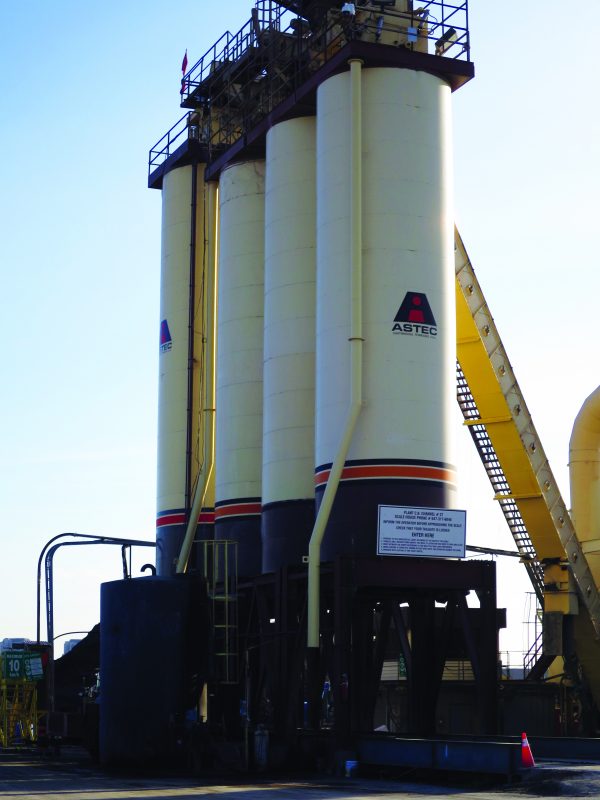A strong emphasis on safety is one of the perquisites hot mix asphalt plant operators must adhere to if they hope to receive the Ontario Asphalt Pavement Council’s (OAPC) Trillium Award.
The awards are given each year for plant operations which meet rigid criteria in safety, plus appearance, operations, environmental initiatives and community relations.
Trillium Award status is granted for a three-year period, at which point the plant must apply again for certification.
In an interview arranged by the OAPC, representatives from three companies highlighted their respective safety procedures and the value they believe the awards convey.
They included Coco Paving and Aecon, which have won the award for a number of their plants and are COR (Certificate of Recognition) certified, and Forest Paving which is actively pursuing both award designation and COR certification for its Woodbridge facility.
Hot mix asphalt plants are highly automated and are operated by a handful of staff. But there is also a constant stream of truck traffic entering and leaving the premises, says Coco Paving superintendent Donato Rita.
“There are probably 150 trucks entering and leaving a plant daily,” says Rita, citing deliveries by aggregates and asphalt cement suppliers and trucks picking up the manufactured asphalt.
With that amount of traffic the need for entering, exiting, and drop off location signage is absolutely crucial.

In the case of Coco Paving the safety precautions don’t end there, he says.
“A new driver first has to be taken on a site orientation tour by a foreman before that driver is granted entry.”
Another critical safety measure in dealing with that high traffic volume is adequate lighting.
Many plants operate double shifts to meet the demand for hot mix asphalt for night road construction, especially on provincial highways in the Greater Toronto Area, says Aecon paving manager Ryan Smetaniuk.
“We also hold weekly safety talks to ensure our employees don’t get too complacent,” says Smetaniuk.
The need for weekly safety sessions and daily toolbox talks was also underscored by Forest Paving general manager Davin Bartello.
About six years ago the company purchased the Woodbrige plant as part of its transition into municipal road construction from simply paving parking lots.
During the interview Bartello acknowledged he had obtained ideas from the other two interviewees as Forest Paving moves forward with the documentation necessary to become a Trillium Award winner, possibly in 2020.
An example was Coco Paving policy of mandatory site orientations for new drivers arriving at their plant gates
As English is not the first language for an increasing number of truck drivers, there is a “real need for a number or oral orientations” and not relying simply on signage, he says.
“It helps to learn the best industry practices,” says Bartello, who is a member of OAPC’s plant and paving committee which oversees the Trillium Award program.
In a separate telephone interview Fermar Paving equipment manager Kyle Martin noted those practices included a wider use of technology to ensure jobsite safety.
Just one example is the use of sensors to prevent overtopping and spillage of the asphalt cement as its being pumped into the plant silos.
“That (spillage) is dangerous to and workers below and the cleanups are costly. We (Fermar) have been using this type of technology for the past five years.”
Like the others, Martin is a firm believer in the importance of the Trillium Awards which were created in 2002 by the Ontario Hot Mix Producers Association — which became the council in early 2017.
“They (the industry) wanted to be a good neighbour,” says committee chair Mike Deckert, in providing a short history of the awards.
“It’s a self-assessment of their plant,” says Deckert, in listing the steps operators must follow to be considered for the award.
The first step is downloading an 11-page application — which they pay $300 for — and then completing an intensive evaluation. There are 400 eligible points and applicants must achieve 80 per cent.
As part of a 2018 revision, operators can receive additional points if they’re COR certified, he says.
In addition, they have to provide 16 photos of different facets of the plant operation and a maximum five-minute video which is reviewed by the plant and paving committee.
“That review usually takes five to 10 minutes, but sometimes up to 20 minutes. If the committee believes something else is required it will ask the plant operator to provide that.”
The application includes 20 questions pertaining to health and safety and within that list are a core group of six which will result in an “automatic disqualification if the answer is no.
“One of those questions is ‘do you have a violence and harassment policy in effect.’ ”
In the almost 20 years the program has existed the committee did have to disqualify one application, but it was for other reasons than safety issues, says Deckert.
Although an internal review, a third-party audit and inspection of the plant is also conducted, he says, some changes may be in store for the program. Currently, operators have until November to file their submission to be considered for that year’s award list.
“But that is crunch time for them as the construction season is coming to a close. We are considering changing the deadline to May. That still has to be determined.”
Plans are also underway for a major campaign to promote the benefits of the awards to OAPC members who have not taken advantage of it.
Key planks in the campaign will include promotional events at industry seminars and increased publicity in OAPC’s trade magazine.
Also under consideration is the possibility of providing award winners with large-scale decals which they could erect on the plant’s silos and control houses, says Deckert.











Recent Comments
comments for this post are closed